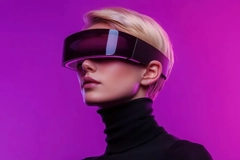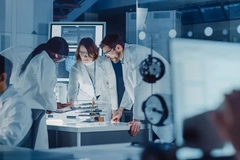Kolmar Korea selected to drive government’s AI manufacturing revolution
Key takeaways
- South Korea aims to expand its “AI factories” fivefold by 2030, under the Manufacturing AI Transformation Strategy.
- Kolmar Korea is the only cosmetics company chosen for the government’s AI Factory Alliance.
- The company targets 95% production accuracy through autonomous AI systems to advance K-beauty’s global edge.

Kolmar Korea has been selected as the only cosmetics company to join South Korea’s AI Factory Alliance. The alliance aims to reinvent the country’s manufacturing sector through artificial intelligence.
The government’s Manufacturing Artificial Intelligence Transformation (MAX) Strategy marks a shift from automated to fully autonomous production. Through the strategy, the government aims to build a new generation of “AI factories” that can operate autonomously using real-time data and machine learning instead of relying solely on human-controlled automation.
Kolmar Korea’s inclusion in this project reflects its technical readiness and the growing role of the beauty sector in Korea’s industrial identity.
The beauty company’s contribution will focus on creating a fully autonomous cosmetics production line that can optimize itself based on data from real-time monitoring. This means AI will be able to identify issues, make independent adjustments, and ensure consistent quality without constant human oversight.

“Being the only cosmetics company selected as a lead participant in the AI Factory project recognizes our technological expertise and innovation capabilities,” a Kolmar Korea representative says.
“Through our AI-based autonomous manufacturing system, we aim to strengthen the global competitiveness of K-beauty and elevate the overall standard of Korea’s cosmetics manufacturing industry.”
Counting on Kolmar
Kolmar Korea was selected to participate in the AI Factory Alliance under the Ministry of Trade, Industry and Energy (MOTIE)’s supervision.
The company has been operating a smart factory system since 2019, which has reduced defect rates by 42%.
“While some cosmetics processes still rely on manual labor, we will share success cases to help domestic companies reference best practices,” a Kolmar representative says.
.webp) Kolmar Korea’s AI-based system will monitor and optimize every stage of cosmetics production, targeting 95% precision by 2029.As part of the AI Factory project, Kolmar Korea will spend four years and four months developing an autonomous production system tailored for cosmetics manufacturing.
Kolmar Korea’s AI-based system will monitor and optimize every stage of cosmetics production, targeting 95% precision by 2029.As part of the AI Factory project, Kolmar Korea will spend four years and four months developing an autonomous production system tailored for cosmetics manufacturing.
The system will use modular AI models across all production stages, including planning, manufacturing, quality control, filling, and packaging. The company hopes to achieve a 95% accuracy rate and thereby significantly reduce product defects.
“We will lead the AI Transformation of the cosmetics manufacturing industry,” a Kolmar representative says.
“Transitioning from smart factories to AI factories is expected to further reduce rework and establish an advanced manufacturing system optimized for small-scale, multi-product production.”
Factories that think
MOTIE leads the MAX strategy in collaboration with the Ministry of Small and Medium-sized Enterprises (SMEs) and Startups and the Ministry of Science and Information and Communication Technology. The interministerial approach aims to coordinate resources across different policy areas to achieve rapid progress.
By 2030, the government plans to increase the number of AI factories from around the current 100, to 500 nationwide. The fivefold expansion is designed to embed AI capabilities across all major industrial sectors, such as automotive, shipbuilding, electronics, logistics, and beauty.
The government’s long-term goal is to make Korea a global leader in AI-powered manufacturing and industrial automation by pivoting from smart factories to AI factories.
Smart factories automate preset tasks, but AI factories use algorithms that analyze sensor data in real time. The technology allows the factory to predict issues and adjust production variables automatically to enhance precision and efficiency.
The initiative is part of Korea’s broader Smart Manufacturing Innovation 3.0 Policy, which seeks to help SMEs adopt AI technologies.
“SMEs and small business owners are in a situation where survival depends on the ability to adopt and utilize AI. We will focus on AI-based manufacturing innovation, the growth of ventures and start-ups, and the broader use of AI among small businesses,” Han Seong-sook, South Korea’s minister of SMEs and Startups, said during a government announcement.
.webp) Automated equipment in Korean cosmetics plants reflects the government’s push toward self-learning, AI-powered production.The government has expanded its 2026 budget for AI transformation programs by 84%. It now allocates ₩455.2 billion (US$318.33 billion) to strengthen manufacturing competitiveness and foster AI start-ups.
Automated equipment in Korean cosmetics plants reflects the government’s push toward self-learning, AI-powered production.The government has expanded its 2026 budget for AI transformation programs by 84%. It now allocates ₩455.2 billion (US$318.33 billion) to strengthen manufacturing competitiveness and foster AI start-ups.
Meeting innovation demands
Cosmetics are one of South Korea’s key export industries. The country’s Customs Service announced last week that it broke its export record, reaching US$8.52 billion in the first three quarters of 2025, up 15.4%.
Applying AI at the country’s current cosmetics production scale could redefine global beauty operations.
One challenge cosmetics companies face is keeping up with consumers’ demand for new products. A recent report by Atelier and Accenture found that 64% of shoppers want brands to respond faster to their needs, but outdated manufacturing practices delay innovation.
Some K-beauty companies have partnered with suppliers closer to markets to address slow lead times. Meanwhile, Kolmar Korea announced earlier this year that it had completed construction on its second manufacturing facility in the US, which featured AI-powered quality control systems.













